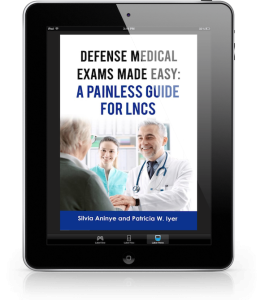The Role of Defense Medical Exams (DMEs) in Legal Proceedings

As an LNC, you will encounter Defense Medical Exams (DMEs), also known as Independent Medical Examinations (IMEs), which are pivotal in various legal contexts.
Examples include:
- Workers’ compensation claims
- Personal injury lawsuits
- Disability cases, and more
These exams, conducted by healthcare professionals, provide an evaluation of an individual’s medical condition, aiding in the resolution of legal disputes.
In this post, I delve into the purpose, process, and significance of DMEs, highlighting their importance in different legal scenarios.
Purpose of Defense Medical Exams:
The primary objective of DMEs is to offer an assessment of an individual’s medical condition.
Unlike routine medical exams conducted by a treating physician, DMEs are arranged for and paid for by a third party. For example, an employer or insurance company, to obtain an unbiased evaluation of the individual’s health status. It may include treatment needs, and prognosis, particularly in cases involving legal claims or disputes.
Key Aspects of Defense Medical Exams:
DMEs are conducted by healthcare professionals who have no prior relationship with the individual being examined.
These exams aim to provide an assessment of an individual’s medical condition. A thorough review of their medical history, a comprehensive physical examination, and, if permitted by the facts of the case, additional tests or assessments.
DMEs are evaluations that are supposedly not influenced by any party involved in the legal proceedings. The healthcare professional’s role is to provide an unbiased assessment based on their medical expertise. However, there is inherent bias in the exam because the physician is paid by the insurance carrier.
Following the exam, the physician prepares a detailed report. It outlines the findings, conclusions, and any recommendations for further treatment or care. This report serves as crucial evidence in legal proceedings.
Legal Contexts Where Defense Medical Exams Are Used:
Workers’ Compensation Claims:
DMEs are utilized to assess the extent of work-related injuries or illnesses claimed by employees. Determining their current medical condition, treatment needs, and ability to return to work is vital information.
Personal Injury Lawsuits:
In personal injury cases, DMEs evaluate the nature and severity of injuries, the extent of disability, and therefore needs ongoing medical treatment or rehabilitation.
Disability Cases:
DMEs assess an individual’s physical or mental impairment and its impact on their ability to work or perform daily activities, determining eligibility for disability benefits.
Process of Defense Medical Exams:
The process of a DME typically involves:
Referral: The party requesting the exam selects a healthcare professional to conduct it, and the individual being examined is notified of the appointment.
Examination: The exam includes a review of the individual’s medical history and a physical examination. Additional testing is usually prohibited with the exception of dental x-rays.
Report: Following the exam, a detailed report is prepared outlining the findings, conclusions, and recommendations. Hence, this report is submitted to the requesting party and used as evidence in legal proceedings.
Follow-Up: The healthcare professional may recommend follow-up care or additional treatment based on their findings, including referrals to specialists or additional tests. But they have no role as a treating physician.
Significance of Defense Medical Exams:
DMEs play a crucial role in legal proceedings by providing an assessment of an individual’s medical condition. Above all they ensure that legal decisions are based on accurate medical information, contributing to fair outcomes. Additionally, DMEs help reduce the burden on the healthcare system by providing alternative medical expertise for legal purposes.
Defense Medical Exams are essential tools in various legal contexts, offering an assessment of an individual’s medical condition.
Conducted by healthcare professionals, DMEs help:
- Clarify complex medical issues
- Ensure fair outcomes in legal proceedings, and
- Contribute to the integrity of the legal system.
Understanding the purpose, process, and significance of DMEs is vital for anyone involved in legal proceedings where an individual’s health status is in question.
This post is only the tip of the iceberg regarding defense medical exams/records. In this blog series, I will share more information about the DME process.
I co-authored a new book with Silvia Aninye RN, AS, FCM, CLNC. It’s called ‘Defense Medical Exams Made Easy: A Painless Guide for LNCs’.
‘The Defense Medical Examinations Made Easy’ book provides a strong framework for the LNC setting out to witness a defense medical examination. You will know exactly what you need from the attorney, how to prepare your patient-client and so much more.
To order, click here.

Pat Iyer is president of The Pat Iyer Group, which develops resources to assist LNCs in obtaining more clients, making more money, and achieving their business goals and dreams.
Have you heard the most recent podcasts on Legal Nurse Podcast? The show is in its 8th year, putting it in the top 1% of all podcasts for its longevity. Watch our podcast on YouTube at http://LNC.tips/YouTube.
Join our Facebook group, LNC Business Growth Circle, to be part of our LNC community.
Pat’s related websites include the continuing education provided on LNCEU.com.
The podcasts are broadcast at podcast.legalnursebusiness.com, and writing tips supplied at patiyer.com.
Get all of Pat’s content in one place by downloading the mobile app, Expert Edu at www.legalnursebusiness.com/expertedu. Watch videos, listen to podcasts, read blogs, watch online courses and training, and more.



[…] The examination reviews your medical history and includes a full physical assessment. Your examiner asks about your symptoms, pain, and what you can or can’t do. […]
[…] the doctor will order more tests, like x-rays, if they need more detail. Still, extra testing is usually limited in these […]